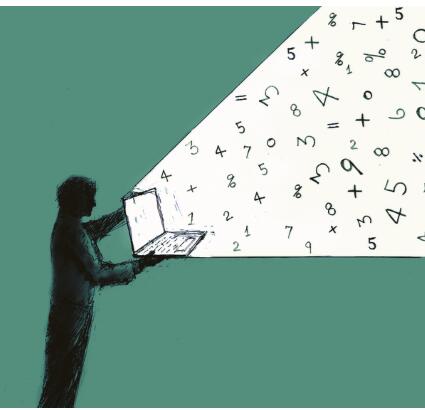六级课程经典
零基础速升HOT
去试听
六级1对1
定制化
12月六级 终极干货
押题
无痛版听力提升
0元
六级阅读 冲刺200+大招
0元
六级真题+答案
免费
听力提升 VOA&BBC原声
热门
1V1速成方案VIP
保研全流程免费
考研真题大全
免费
计算机考研
择校
27考研书单
推荐版
考研AI择校
智能体
2017年6月英语六级真题及答案已发布,同时新东方在线名师团对真题进行权威解析,→→点击免费领取六级真题解析直播。更多2017年6月英语六级听力真题及答案、英语六级作文真题及 答案、英语六级阅读真题及答案、英语六级翻译真题及答案,请查看【2017年6月英语六级真题答案解析】专题!
2017年6月英语四级真题及答案 | ||
作文 | ||
听力 | ||
阅读 | ||
翻译 | ||
Data-sharing: Everything on display
· Richard Van Noorden
Published onlin 07 August 2013
This article was originally published in the journal Nature

Lizzie Wolkovich always felt she ought to make her research data freely available online. “The idea that data should be public has been in the background through my entire career,” she says.
Yet in 2003–09, while she was working on her ecology PhD, there were few incentives for her to share. Sharing would not help her to get grants or publications, and although posting data online was not unheard of, few researchers actually did it, she says. Many preferred to hang on to their hard-won field data, sharing privately if they did so at all.
But after she earned her doctorate, Wolkovich overcame her hesitation, thanks to a combination of helpful colleagues, improved resources and a discernible shift in the research community's attitude. So in 2010, through an online data repository called the Knowledge Network for Biocomplexity, Wolkovich released her doctoral data set — the fruit of thousands of hours spent measuring the diversity of arthropods in 56 experimental soil plots she had set up in the arid scrubscape of southern California. Since then, she has publicized all the data that she has collected, including a meta-analysis of 50 other studies that she examined to see how factors such as rising temperatures affect the life cycles of plants. Wolkovich, now at the University of British Columbia in Vancouver, Canada, says that she herself had never objected to sharing her results — she had just not known how to do so. She likes the fact that her data are now easily accessible to other researchers and anyone else who is interested. “It saves me so much time,” she says.
Wolkovich is one of a number of early-career researchers who are enthusiastically posting their work online. They are publishing what one online-repository founder calls small data — experimental results, data sets, papers, posters and other material from individual research groups — as opposed to the 'big data' spawned by large consortia, which usually employ specialists to plan their data storage and release. The many resources now available give researchers options for where and how to post their data, releasing potentially fruitful data sets that used to be locked up in unpublished paper files, buried in journal-article appendices or hidden away on scientists' hard drives.
Opening up
Open data-sharers are still in the minority in many fields. Although many researchers broadly agree that public access to raw data would accelerate science — because other scientists might be able to make advances not foreseen by the data's producers — most are reluctant to post the results of their own labours online (see Nature 461, 160–163; 2009). When Wolkovich, for instance, went hunting for the data from the 50 studies in her meta-analysis, only 8 data sets were available online, and many of the researchers whom she e-mailed refused to share their work. Forced to extract data from tables or figures in publications, Wolkovich's team could conduct only limited analyses.
Some communities have agreed to share online — geneticists, for example, post DNA sequences at the GenBank repository, and astronomers are accustomed to accessing images of galaxies and stars from, say, the Sloan Digital Sky Survey, a telescope that has observed some 500 million objects — but these remain the exception, not the rule. Historically, scientists have objected to sharing for many reasons: it is a lot of work; until recently, good databases did not exist; grant funders were not pushing for sharing; it has been difficult to agree on standards for formatting data and the contextual information called metadata; and there is no agreed way to assign credit for data.
本文关键字: 英语六级仔细阅读
 推荐阅读
推荐阅读
考六级的同学们,明天就是2023年12月英语六级成绩查询入口开启的日子,本次六级成绩查询入口开启时间非常早,明天早上6点就会开启,有早起的同学,可以进行查分了哦。
来源 : 新东方在线 2024-02-26 17:36:49 关键字 : 六级成绩查询入口
最新消息,官方已经正式公布了2023年12月英语六级考试成绩查询时间,将于下周二2月27日上午6时开启英语六级考试成绩查询入口。届时,参
来源 : 网络 2024-02-22 12:40:16 关键字 :
2023年12月CET6成绩查询时间的官方消息已经公布,将在下周二2月27日上午6时开启CET6成绩查询入口。届时,参加2023年12月六级考试的同学们,可以第一时间上网查分了。
来源 : 新东方在线 2024-02-22 12:35:20 关键字 : CET6成绩查询入口
2023年12月英语六级成绩查询时间的官方消息已经公布,将在下周二2月27日上午6时开启英语六级成绩查询入口。届时,参加2023年12月四级考试的同学们,可以第一时间上网查分了。
来源 : 新东方在线 2024-02-20 10:34:46 关键字 : 六级成绩查询时间
2023年12月英语六级考试已经在12月16日中午结束了,相信同学们想对下六级答案,估算下自己的六级成绩。新东方六级老师已经第一时间整理
来源 : 网络 2023-12-16 18:20:12 关键字 : 2023年12月六级答案,六级真题
